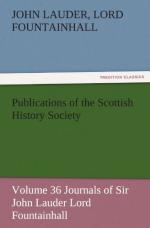[627] The first page, as above, within brackets, is scored out in MS.
Upon the 27 of September 1669 was Candie toune (being the losse of the wholle Ile to the Venetians) surrendred to the Turks after a long seige wheir the French got a great overthrow, and their Admirall the Duc de Beaufort was killed with many other persons of note: and wheir Monsieur Annand our Master Annands brother behaved himselfe most gallantly, and since hes bein so hylie complemented for that his service by the Venetian senat that I beleive never was any stranger more. He is admitted unto all their counsels and sits upon their Ducks right hand: the Englishs ware so affrontedly impudent as in their new books first to cal him ane Englishman, and being challenged for that they designed him after a subject of his Maj. of Great Brittain, so loath are they to give us our due praise.
In anno 1670 was ane insurrection of the paisants of the country of Vivarets in Daulphinee in France, upon the occasion of some extraordinarie tax cruelly exacted. They ware soon dissipat. Their is presently, in October 1670, a fellow called Ratzin[628] who hes taken up armes in Mosco agt the Emperor, and hes got of followers neir 100,000 men: he was a gunner, had a brother, who, being put to death for some crime, he in revenge of his brothers death hes made this commotion craving nothing lesse but that thesse who ware the cause of his brother’s death (now they are the greatest men about the Ducks persone) may be delivered up to him.
[628] Rebellion of Stenka Razin against the Tsar Alexis.
It is apprehended by the wiser sort that this Union[629] is mainly set on foot by his Majestie, and so much coveted after by him, that he may rid himselfe of the house of Commons who have lyen verie heavy upon his loines and the loins of his predecessors Kings of England and especially of his brave father, and who have ever most crossed ther great designes. Now it being proposed that their should be but on parliament for all Britain, it will follow that the house of commons constitut no more a house apart, but that its members sit togither with the Lords in the house of peers: and for the better effectuating this great point, I hear his Majesty caresses and complements thesse of the house of commons a great deall more then ever he was in use to do, and that he converses most familiarly with them, seikes their company, and that they get accesse when many great persons cannot. But this is not all, such of them as seimed most active and concerned in pressing the priviledges and liberties of that house and of the commonalty of England, his majesty within this short tyme hes nobilitat them, and by this hes both engadged them to his oune party, and by setting them in a hyer sphoere weakned the house of commons.
[629] Charles II. having renewed
the proposal for the union of the
kingdoms,
Commissioners were appointed for England and Scotland,
and
sat in London for some months in the autumn of 1670.




